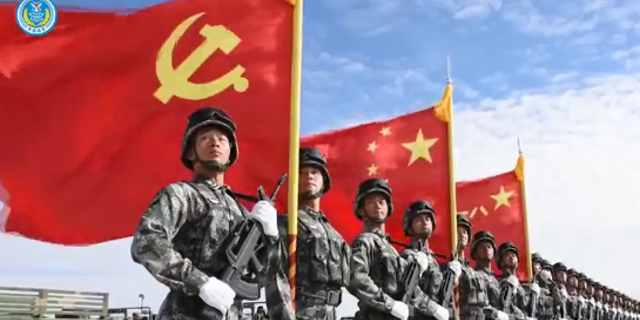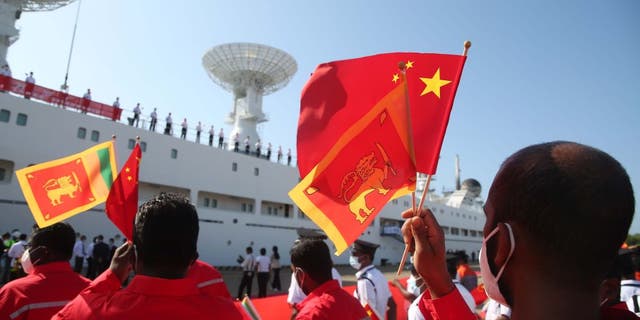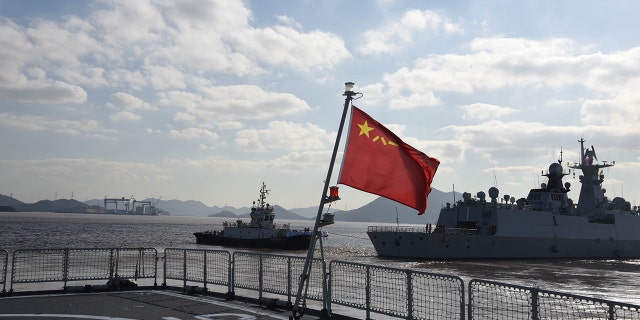2023.06.03
 U.S. Secretary of Defense Lloyd Austin speaks at the First Plenary Session of the 20th IISS Shangri-La Dialogue in Singapore June 3, 2023
U.S. Secretary of Defense Lloyd Austin speaks at the First Plenary Session of the 20th IISS Shangri-La Dialogue in Singapore June 3, 2023
UPDATED at 12:44 p.m. ET on 2023-06-11
U.S. Secretary of Defense Lloyd Austin has urged China’s military leaders to engage after his call to meet with the Chinese counterpart was rebuffed, saying open lines of communication are “essential.”
In his key address to the Shangri-La Dialogue security forum in Singapore on Saturday, Austin said that he is “deeply concerned that the PRC has been unwilling to engage more seriously on better mechanisms for crisis management between our two militaries.”
The defense secretary referred to China by its official name the People’s Republic of China.
“For responsible defense leaders, the right time to talk is anytime, the right time to talk is everytime and the right time to talk is now,” he said, adding that “dialogue is not a reward. It is a necessity.”
“And the more that we talk, the more that we can avoid the misunderstandings and miscalculations that could lead to crisis or conflict.”
Secretary Austin and Chinese Minister of National Defense Li Shangfu, who has been under U.S. sanctions since 2018, shared a brief handshake before an official dinner on Friday but did not speak to each other nor is a bilateral meeting between them anticipated.
"A cordial handshake over dinner is no substitute for a substantive engagement," Austin said.

The U.S. defense chief slammed China which, he said, “continues to conduct an alarming number of risky intercepts of U.S. and allied aircraft flying lawfully in international airspace.”
Just last week, the U.S. military accused a Chinese J-16 fighter jet of performing an "unnecessarily aggressive" maneuver during the intercept of a U.S. Air Force RC-135 reconnaissance aircraft.
“We do not seek conflict or confrontation, but we will not flinch in the face of bullying or coercion,” Austin said.
The obvious rift between the two powers has “become the new reality,” said Huong Le Thu, a non-resident fellow at the Center for Strategic and International Studies (CSIS).
Regional countries have to accept it whether “they like it or not,” she told RFA.
“But they can contribute to managing the tensions by lowering the heat through facilitating and encouraging dialogues between the U.S. and China,” the analyst added.
Shared vision
Hours after Austin gave his speech, the U.S. State Department announced that Daniel J. Kritenbrink, the assistant secretary of state for East Asian and Pacific Affairs, was going with a senior White House official to China to “discuss key issues in the bilateral relationship.”
Sarah Beran, senior director for China and Taiwan Affairs at the National Security Council, was to join Kritenbrink for the talks in Beijing, the State Department said in a statement released on Saturday morning (Washington time). Kritenbrink will be traveling to China and New Zealand, from June 4 through June 10, the statement said.
In his speech at the Singapore forum, Carlito Galvez Jr., senior undersecretary and officer-in-charge at the Philippine Defense Department, said Manila believes that “the international law is the greatest equalizer among states.”
The Philippines won a legal case against China’s claims in the South China Sea at a U.N. tribunal in 2016 but Beijing has so far refused to accept the ruling.
The two countries have recently been embroiled in a new spat over their sovereignty in some of the islands in the Spratly archipelago.
"As the old adage goes, good fences make good neighbors," Galvez said.
"It is only when neighbors have clear boundaries and respect for set boundaries that relations remain genuinely amicable," the acting defense secretary said.
Indonesia’s Defense Minister Prabowo Subianto said it is “imperative for us to overcome our geopolitical rivalries, our territorial disputes through dialogues, negotiations and win-win solutions.”
“Compromise is the only way that communities and societies can prosper,” he said, warning that the rivalry between superpowers “has turned into a Cold War” and in any war, “the danger of a catastrophe is always near.”

U.S. Defense Secretary Austin, however, insisted that his country “does not seek a new Cold War.”
“Competition must never spill over into conflict. And the region should never be split into hostile blocs,” he said.
Austin said Washington is not creating nor willing to create a new NATO in the Indo-Pacific as China has repeatedly alleged.
Yet the U.S. wishes to build “nimble coalitions to advance our shared vision” in order to make the Indo-Pacific “more stable and more resilient,” Austin said.
Washington lists Australia, Japan, the Republic of Korea, the Philippines, and Thailand as its “staunch allies” in the region and sees India, Indonesia, Vietnam, and Singapore as “valued partners.”
Speaking about self-ruled Taiwan, Austin said his country “remains deeply committed to preserving the status quo there, consistent with our longstanding one-China policy, and with fulfilling our well-established obligations under the Taiwan Relations Act.”
“Conflict is neither imminent nor inevitable. Deterrence is strong today, and it’s our job to keep it that way,” the secretary stated.
Beijing considers Taiwan a Chinese province and resolutely protests against any involvement by “external forces” in the island’s politics.

Lt. Gen. Jing Jianfeng, deputy chief of the Central Military Commission’s Joint Staff Department, hit back at Lloyd Austin’s speech about Taiwan, saying it was “completely wrong.”
“There’s only one China in the world, and Taiwan is a sacred and inalienable part of Chinese territory,” Jing said, adding that “it is the common aspiration and sacred responsibility of all Chinese people, including our Taiwan compatriots, to complete the reunification of the motherland.”
China’s counterattack
A researcher at People’s Liberation Army (PLA) Academy of Military Sciences, Senior Col. Zhao Xiaozhuo, said that it is the U.S. who has been trying to change the status quo in the Taiwan Strait.
“The Taiwan Strait was pretty stable in the last ten years or so but the U.S. wants to destroy this stability,” Zhao told reporters at the Shangri-La Dialogue.
“That way they can sell weapons to Taiwan and make a lot of money,” he said.
Chinese participants at the security forum in Singapore have taken a proactive approach to counter criticism from the U.S. and its allies.
Senior Col. Zhao said that Washington needs to change what he calls “erroneous actions” in the way it interacts with others.
“When it comes to dialogue you have to take care of the opposite party’s interests,” he said, accusing the U.S. side of not understanding this basic principle.
Another Chinese delegate, Senior Col. Zhang Chi from the National Security College at China’s National Defense University, questioned whether Washington had contradicted itself by establishing multilateral institutions while promoting the centrality of the Southeast Asian bloc ASEAN.
Meanwhile, Maj. Gen. Tang Yongshen, former deputy commandant of the same college, hit back at Canadian Defense Minister Anita Anand for calling China a disruptive force in the region.
“China has made great efforts to maintain peace and stability in the region,” Tang said.
“In fact, what you said is disruptive,” he added bluntly.
A Chinese Communist Party mouthpiece, the Global Times, quoted a military official as saying in a report on Saturday that “China is confident to step on the stage and raise its voices.”
“Despite knowing the Shangri-La Dialogue is a platform dominated by Western countries to attack China, China comes anyway,” the paper said.
China’s Defense Minister Li Shangfu will deliver a major speech on Beijing’s new security initiatives on Sunday, the last day of the forum.
Edited by Mike Firn. This report has been updated to include news about the announced trip to Beijing by senior U.S. officials.
https://www.rfa.org/english/news/china/us-china-defense-chiefs-06032023035432.html







